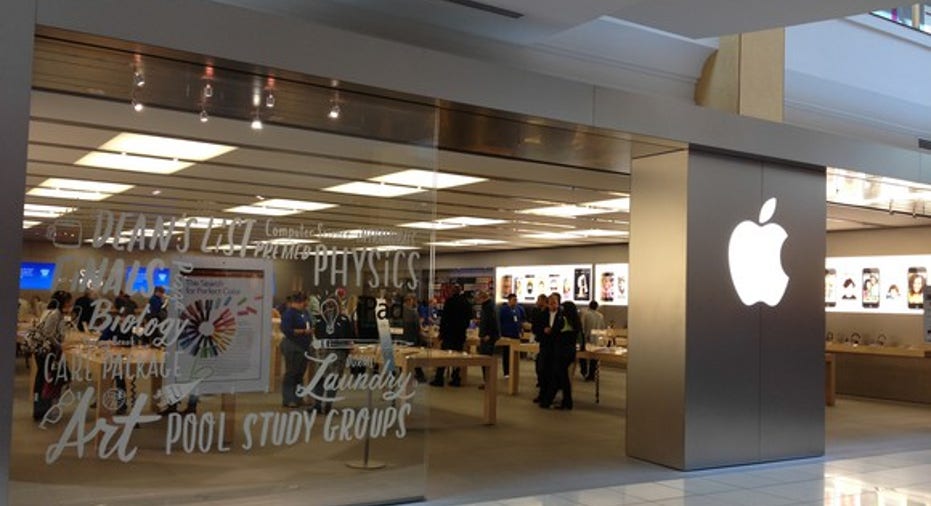3 Reasons Apple Isn't Buying Sirius XM

Image source: The Motley Fool.
When it comes to playing Cupid, Mad Money's Jim Cramer packs a pretty big bow. When he talks, people listen, but that doesn't mean his arrows will stick. He took a pretty big swing on Thursday night, trying to propose Apple's (NASDAQ: AAPL) next buyout target.
"I've got a terrific new merger idea that would seriously benefit both Apple and the takeover target in question," Cramer offered.
The idea isSirius XM Radio(NASDAQ: SIRI), and it has nearly no chance of happening. Cramer's reasoning is that snapping up the satellite-radio provider would make Apple a bigger force in the car, something the consumer-tech giant is already angling for with its CarPlay infotainment platform and rumblings of self-driving cars. Cramer calls Sirius XM a "back door to the connected car" for Apple. With Liberty Sirius XM (NASDAQ: LSXMA) owning a controlling stake in the premium-radio giant, Apple's board wouldn't need to get a lot of heads to nod to make it happen.
Spoiler alert: It won't happen. Cramer may have some valid points in his proposed pairing, but there are a few good reasons the two just aren't hooking up anytime soon.
1. Apple investors won't let it happen
Apple seems mortal these days. It posted a year-over-year revenue decline in its latest quarter, something that hasn't happened in 14 years, and analysts see the trend continuing for a couple of more quarters. But that doesn't mean Apple's desperate. It has historically innovated its way out of the lulls, and that's something that has happened organically.
It's true that Apple has more than $230 billion in cash and investments on its balance sheet, but that doesn't mean it will buy its way out of its current rut. The biggest purchase in Apple's history was $3 billion for Beats. It would have to cut a far bigger check here.
Cramer argues that Sirius XM would boost Apple's growing subscription and services revenue. It would be dilutive in the near term, as Sirius XM has a trailing earnings multiple of 35, while Apple's fetching a mere 12 times earnings. Sirius XM also trades at double the price-to-sales ratio. The valuations get kinder if we look ahead instead of back, but it would still be a dilutive transaction -- and one that would also eat at Apple's net margin, which is double what Sirius XM is ringing up these days.
2. Sirius XM investors won't let it happen
Even with Liberty commanding a controlling stake in Sirius XM, settling on a price to take the satellite-radio darling out wouldn't be easy. Sirius XM is at the top of its game. It hit a 10-year high this summer. It's not going out at market prices.
Sirius XM stock has been one of the market's biggest winners since bottoming out at $0.05 in 2009. It has too much momentum to settle on the way out, no matter how convenient it may seem for Liberty to have an exit strategy in place with one of the few viable buyers.
Let's also consider the purchase price. Cramer points out how Sirius XM has a market cap of $20 billion, but even if the deal would happen without a premium -- a ridiculous notion -- that's not what a buyer would pay. The buyout price would be the enterprise value of $26 billion, given Sirius XM's heady debt. Cramer argues that the deal makes sense even if Apple has to pay $30 billion or $40 billion, and while I imagine that Liberty and Sirius XM's smaller shareholders wouldn't scoff at $40 billion, it would be twice as dilutive to Apple's stock as the math I presented a few paragraphs back. A lot of Apple's money is also locked up overseas. We can't forget that.
3. Regulators won't let it happen
Even if Apple were willing to pay up for a highly dilutive deal and Sirius XM would be willing to forgo its faster and more consistent growth, antitrust regulators aren't likely to let this happen.
It took regulators a year and a half to sign off on the combination of Sirius and XM. It took that long because the merger created a monopoly. However, with Sirius and XM on the brink of buckling, the combination seemed like a better path than letting one die on its own. The country's satellite-radio monopoly is now a healthy beast. Would regulators really let the world's most valuable consumer-electronics company -- one with a growing presence in cars through CarPlay and already a beast in digital music -- absorb a subscription monopoly? Not a chance, no matter how exciting the idea sounds coming out of Cramer's mouth.
A secret billion-dollar stock opportunity The world's biggest tech company forgot to show you something, but a few Wall Street analysts and the Fool didn't miss a beat: There's a small company that's powering their brand-new gadgets and the coming revolution in technology. And we think its stock price has nearly unlimited room to run for early in-the-know investors! To be one of them, just click here.
Rick Munarrizowns shares of Apple. The Motley Fool owns shares of and recommends Apple. The Motley Fool has the following options: long January 2018 $90 calls on Apple and short January 2018 $95 calls on Apple. Try any of our Foolish newsletter servicesfree for 30 days. We Fools may not all hold the same opinions, but we all believe thatconsidering a diverse range of insightsmakes us better investors. The Motley Fool has adisclosure policy.



















